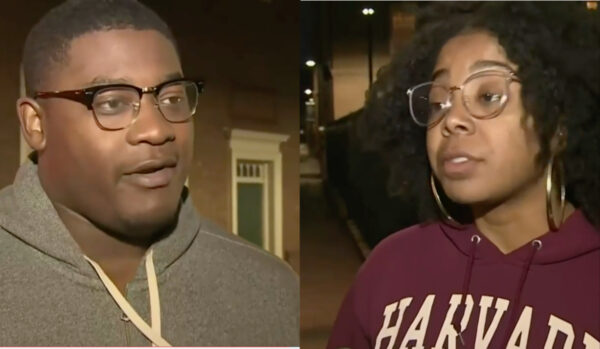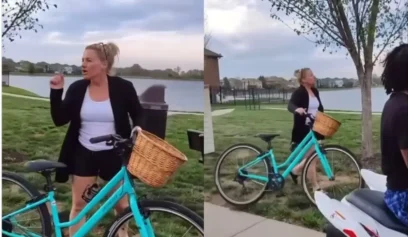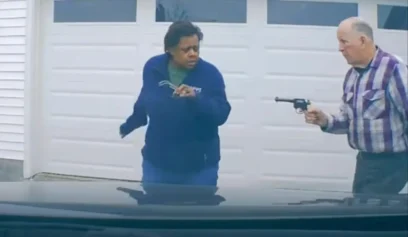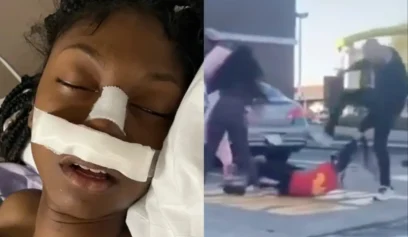Black students rallied outside of Harvard University’s Massachusetts Hall as eight students sat in a closed-door meeting with top school officials, hoping for their demands to be met by senior administrators.
After an hour of going back and forth, students say the school decision-makers heard them out but failed to agree to any of their wishes.
Eight student leaders had five demands, all connected to the “swatting” attack on four students at the Leverett House on April 3.

On that morning, the Harvard University Police Department, responding to a hoax 911 call, swarmed the dorm room of four students with their guns out — ordering them out of their room at the crack of dawn.
The young scholars Jarah K. Cotton, Jazmin N. Dunlap, David G. Madzivanyika and Alexandra C. René say they are now traumatized by how they were treated during the botched raid.
Students and their supporters allege the incident was fueled by stereotypes and systemic racism, demanding the institution investigate how campus security and law enforcement addresses people of color.
Within their demands, presented by 45 Black student organizations on the campus, officials were asked to issue a university-wide statement about the incident. Also as part of the demands: deliver justice to the targeted students via a real investigation, grant access to police reports and regular updates on ongoing investigations to those directly involved, host a town hall meeting with top leaders within the Crimson community and implement “proactive mental health responses” for the students involved in the incident.
The open letter was published in the school’s newspaper on April 21.
“We assert that Black students should not have to live in fear of the police force being used as a weapon against them. We condemn the University’s failure to, at large, protect its Black community’s emotional and physical wellbeing in the aftermath of such trauma,” it read.
“We demand that the University take action to repair the manifestations of the inaction and to ensure that the victims of the phone call are served justice, the safety of Black Harvard students is maintained, and that in future incidents, the mistakes from this situation are not repeated.
After reading the open letter, the senior administration agreed to meet with the leaders.
The meeting was hosted on Friday, April 28, and included Harvard president Lawrence S. Bacow, president-elect Claudine Gay, dean of the College Rakesh Khurana and HUPD chief Victor A. Clay.
Students had varying responses to the meeting with the Harvard Black Students Association president, Angie Gabeau — who plans to graduate in 2025 — saying she was a “little disappointed in the fact that none of the demands were really met,” according to The Crimson.
“It was kind of more just a, ‘We’ll have another meeting to talk about it more,’” Gabeau said. “But hopefully meetings in the future will be more successful in terms of meeting that demand.
Brian A. Cromwell, a 2023 graduate, who is the Black Community Leaders co-chair, said he thought “the conversation was productive.”
The senior also was a part of the drafting of the initial open letter that included the demands.
He said, “The administration was receptive to our demands and acknowledged that the situation should have been handled better. Though we were not able to flesh out everything within the hour-long time frame, I believe that the administration will continue this conversation with the Black Community.”
Prince A. Williams, one of those selected to represent the Black student’s interests, said the officials did not wince at their shortcomings and acknowledged things surrounding the incident could have been done better.
He said the group pressed the administration the entire meeting, asking them to “come up with some material ways to address what we’ve been asking for.”
Williams said this was where the officials seemed slippery.
“They’re still trying to dodge us, they do what a lot of administrators do in these types of meetings, which is to say, ‘We support you; we hear you,’” the sophomore said.
“We’re looking for more than that. We’re looking for deeper conversations,” Williams said regarding the meeting.
Jason A. Newton was assigned to speak for Harvard regarding the meeting and said those administrators in the room were “grateful for the important opportunity Friday to hear from and discuss the concerns raised by students.”
Though the demands were not immediately agreed to, “[The] University and HUPD leaders are continuing to review our response and working to identify lessons to be learned and ways to improve our engagement with the community moving forward.”
Newton noted the meeting was a crucial step for the university because it opened the door for future dialogue about how the school and law enforcement should deal with “public safety incidents” on campus.
“University leaders are committed to further opportunities for community dialogue,” he said.
After the meeting ended, the school president was swift to exit and did not address the protesting students outside Mass hall. Instead, his team created a pathway through Harvard Yard to Johnston Gate and into a vehicle. Some students saw him and attempted to follow him, but he dipped off as the demonstrators shouted, “Black Lives Matter” and “This is what community looks like.”
This did not shock protestors like BSA special events chair Jonathan Haileselassie. The freshman said the school does not value the lives of its students over its traditions, bottom lines and image.
“[Harvard] as a corporation, first and foremost will always put the pursuit of profits over the prosperity of its people,” he said during the demonstration to the hundreds of students gathered.
“Harvard would rather divest from the very food that we eat than from the police that makes us feel uncomfortable at every juncture and harass our unhoused neighbors in the broader community,” he said.


